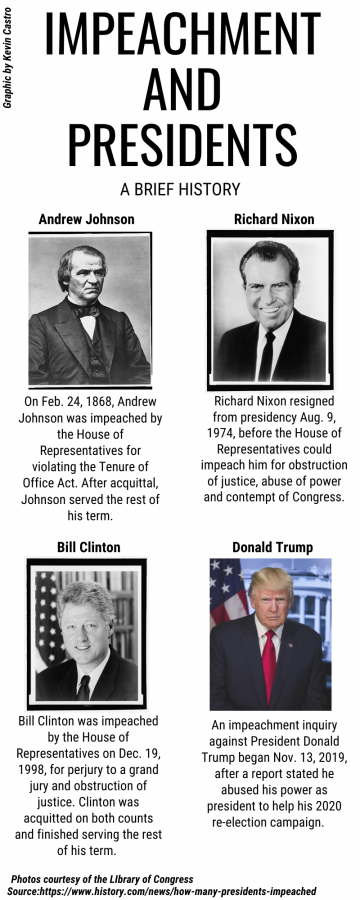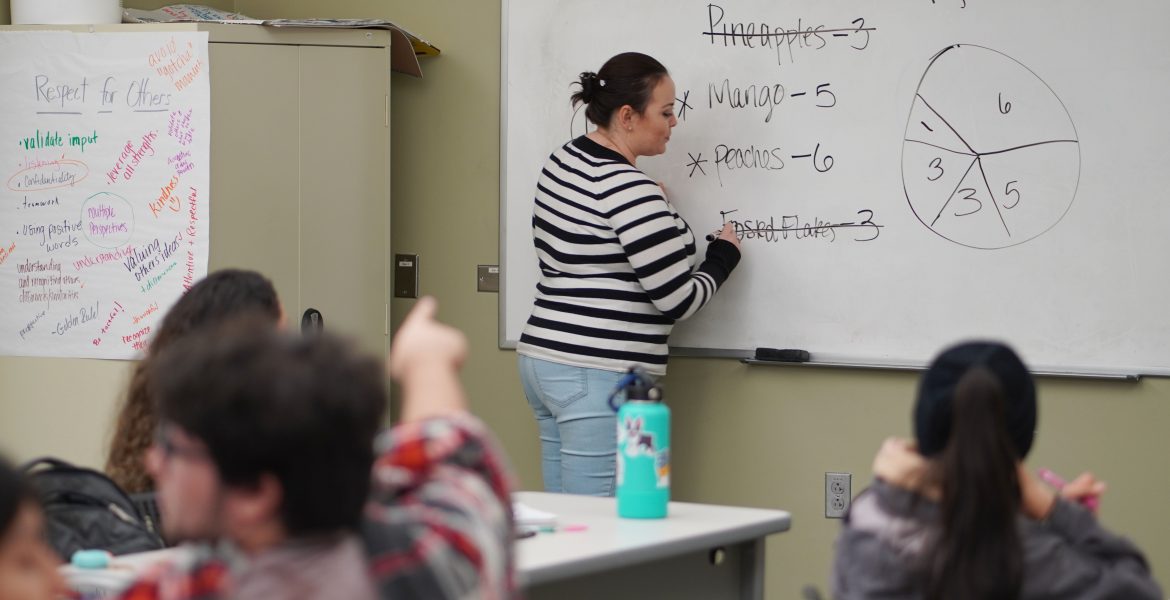The Mesquite recently interviewed students and faculty at Texas A&M University-San Antonio about the impeachment inquiry of President Donald Trump.
Their comments were almost as divided as a recent vote by the House of Representatives.
The impeachment inquiry’s public hearings began Nov. 13 to investigate whether Trump abused his office in an attempt to find information about a political rival.
Impeachment 101: Impeachment is different from removal of a president from office.
The topic of impeachment has made its way into students’ personal lives. Education freshman Krystalynda Garza says her family has had disagreements about it.
“I had a graduation party and I had all of my family there, and we were talking about the impeachment of Trump and I had one aunt who was for Trump and then the other side of my family was against him,” Garza said.
Garza says she agrees with the decision to pursue an impeachment inquiry on Trump.
“I do agree with the impeachment of Trump because I’ve heard of things that he has done both in and out of office,” Garza said. “The bad things he’s done outweighs the good.”
Some believe that the inquiry isn’t necessary, including criminology junior Preston Taggs.
“I don’t agree with it, but that’s my opinion personally,” Taggs said.
He said media has more of an impact today on issues like the impeachment and the word gets out so much faster.
“In this time, everything gets more publicized now with the media,” Taggs said. “We have access to social media, the news and other sources. Everything gets way more attention now compared to when other presidents were in office.”
He said everyone should follow what’s going on with the impeachment and other government issues.
“Although some people agree or don’t agree with this inquiry, they should still keep up with what’s going on in their government,” Taggs said.
The impeachment investigation began in September, when Speaker of the House Nancy Pelosi announced the inquiry to determine if Trump abused his authority by asking a foreign power to influence the 2020 election. In a July phone call, Trump urged the Ukrainian president to investigate Joe Biden, Democratic presidential candidate and former vice president.
Dr. Emily Naasz, political science professor, voiced her thoughts on how no one is above the law.
“We need to set a precedent for upholding the law,” Naasz said, “to future presidents, leaders and politicians that no one is above the law.”
Naasz teaches POLS 3302, Research and Analysis in Political Science
She said this country’s political figures are held to a high standard, and Trump is going against the norms that past presidents followed. His track record shows that he looks for what can be personally gained when he contemplates a new deal for the country, Naasz said.
“The idea of the country being known for ‘quid pro quo’ is not ideal,” Naasz said.
The United States has only had three impeachment inquiries in history. The procedure of
impeaching an acting president is uncommon to most, because the last impeachment inquiry in history was for former President Bill Clinton.
Unlike in Clinton’s case, the offenses that call for an impeachment are piling up for Trump, Naasz said.
 “There have been multiple impeachable offenses that this current president has been absolved from due to no action being taken,” Naasz said.
“There have been multiple impeachable offenses that this current president has been absolved from due to no action being taken,” Naasz said.
She said the president will undoubtedly “build a pillow fort” in the Oval Office to defend his name and power as president.
Numerous Democrats have supported the impeachment inquiry.
Pelosi is one of many who have stepped up on the list to investigate the president’s possible violations with Ukraine. The Federal Election Commission makes it clear that soliciting, accepting, or receiving anything of value from a foreign national while holding a public position is illegal.
With all the nuances and complex information, Naasz says everyone should stay informed that the impeachment inquiry is a nonpartisan act.
“Students should know despite what social media shows, this is not just a partisan act. It is about restoring the rule of law,” Naasz said.
This time in history illustrates how a bad president cannot lead to dictatorship by the power of the House of Representatives, Naasz said.
“It shows that the president doesn’t have all the power to a country,” Naasz said.
She said citizens should come together, let their voices be heard and realize how the president’s actions affect every family in the nation.
“The impeachment is important to our citizens; everyone is being impacted,” Naasz said.
Tanya Romo, a criminal justice senior, seemed to disagree.
“I get that Trump has the kind of in-your-face personality, but at the moment him being president does not affect me as a student,” Romo said, “ I am personally neutral on such a subject only because I feel as though the majority of people have an issue with Trump from his very direct responses on social media.”
Romo described the way Trump decides to respond to different situations as a new take in I’m flexing his authority.
“Trump’s very direct responses can easily be seen as courageous and simply just different,” said Romo.
Mario Alonzo, a senior communications major said it’s a good way to not let their president abuse his authority.
“It shows that the president doesn’t have all the power to a country,” Alonzo said.
“How our president reacts towards big or small situations is not a good look for our country,” Alonzo said.
Business sophomore Greg Quiroz also had his own thoughts for the impeachment on his president.
“I have never lived through an impeachment,” Quiroz said. “it’s scary if you don’t know what’s going on.”






